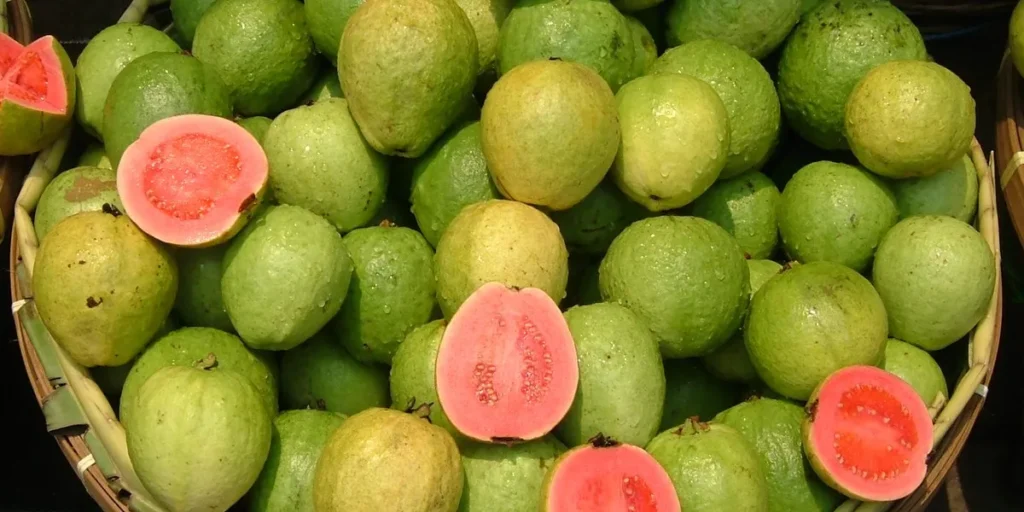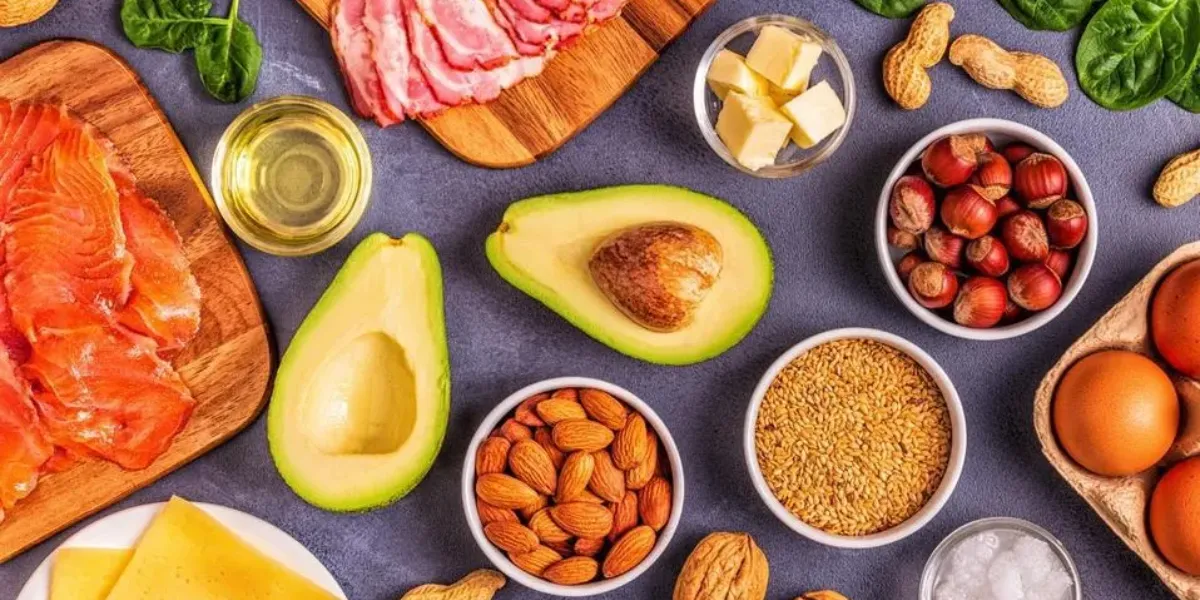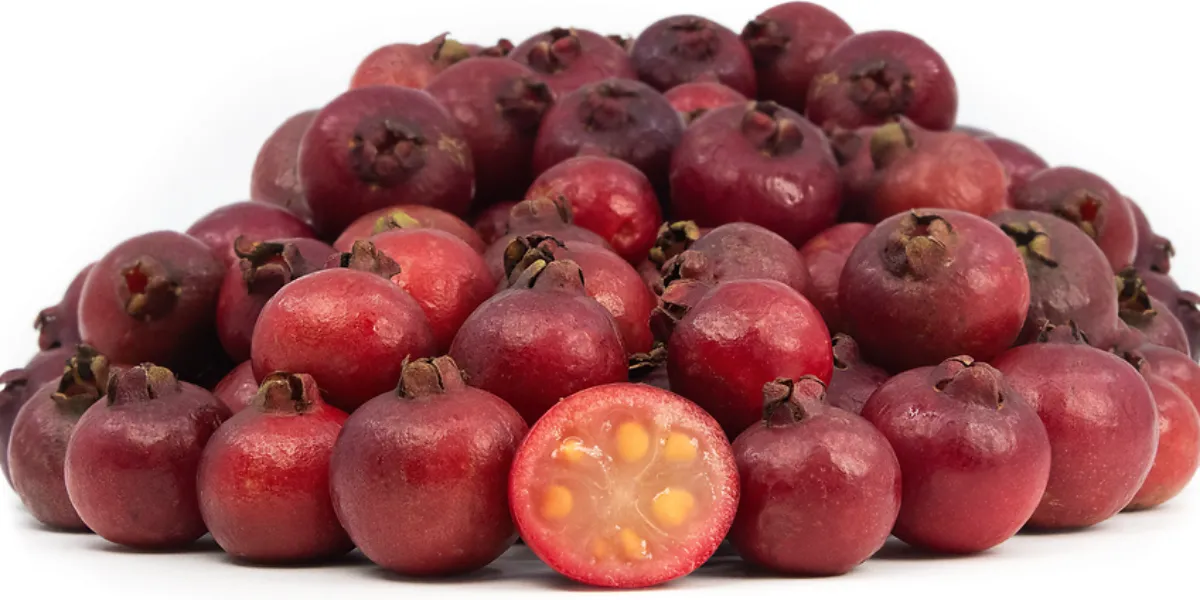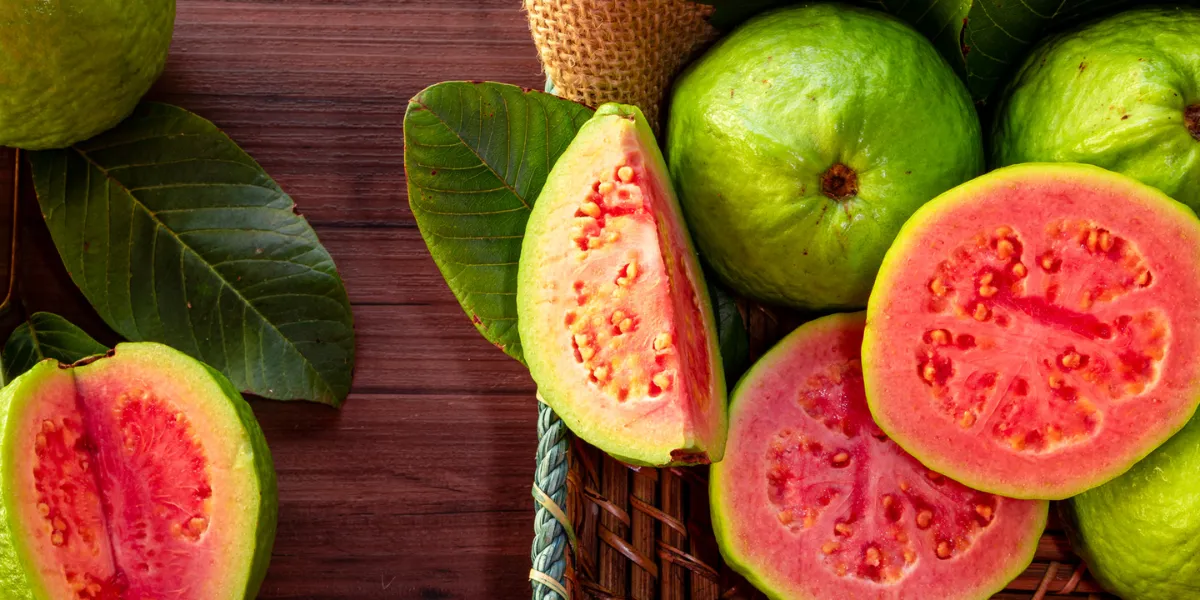The Guava Fruit, a vibrantly colored tropical fruit, is a delicious and nutritious addition to any diet. Native to Central and South America, guavas are now cultivated in many warm regions around the world. This article will delve into everything you need to know about this delightful fruit, from its varieties and health benefits to its culinary uses and tips for selection and storage.
Table of Contents
ToggleGuava Varieties: A Rainbow of Flavors
Guava trees come in over 100 varieties, but the most commonly available types are:
- Apple Guava (Psidium guajava): This is the most widely known guava variety, featuring round to oval-shaped green or yellow skin and white, pink, or red flesh. It has a sweet and tangy flavor with a musky aroma.
- Strawberry Guava (Psidium cattleyanum): As the name suggests, this guava has a strawberry-like scent and a sweeter flavor compared to apple guava. It’s smaller in size with a thinner, reddish skin and white or pink flesh.
- Lemon Guava (Psidium lima): This variety has a light yellow, lemon-colored rind and pale yellow flesh. It’s known for its strong citrusy aroma and tart flavor.
- Pineapple Guava (Feijoa sellowiana): Technically not a true guava but often grouped with them, pineapple Guava Fruit is oblong, green fruit with a sweet and tangy pineapple-like flavor.
Table 1: Comparison of Common Guava Varieties
| Feature | Apple Guava | Strawberry Guava | Lemon Guava | Pineapple Guava |
|---|---|---|---|---|
| Size | Medium to large | Small | Small | Medium |
| Skin Color | Green or yellow | Reddish | Light yellow | Green |
| Flesh Color | White, pink, or red | White or pink | Pale yellow | White or cream |
| Flavor | Sweet and tangy | Sweet and strawberry-like | Tart and citrusy | Sweet and tangy with pineapple notes |
A Nutritional Powerhouse: Health Benefits of Guava Fruit
Guava is a low-calorie fruit packed with essential vitamins, minerals, and antioxidants. Here’s a glimpse into its impressive health benefits:
- Rich in Vitamin C: One guava fruit can provide over 120% of your daily recommended intake of Vitamin C, crucial for immune function, collagen production, and wound healing.
- Boosts Digestion: Guava Fruit is a good source of dietary fiber, promoting gut health and aiding digestion.
- Supports Heart Health: The presence of potassium and dietary fiber in guavas helps regulate blood pressure and reduces the risk of heart disease.
- Antioxidant Powerhouse: Guava is rich in antioxidants like lycopene and vitamin A, which protect cells from damage and may reduce the risk of chronic diseases.
- May Aid Blood Sugar Control: Studies suggest that guava leaves and fruit may help regulate blood sugar levels, potentially beneficial for people with diabetes.
Including Guava in Your Diet: Culinary Delights
Guava’s versatility makes it a welcome addition to various dishes. Here are some ideas to incorporate guava into your meals:
- Enjoy it Fresh: Simply wash, cut, and savor the sweet and tangy flesh of a ripe guava.
- Make a Smoothie: Blend guava with yogurt, milk, and other fruits for a refreshing and nutritious smoothie.
- Create a Tropical Salad: Dice up guava and combine it with other tropical fruits, vegetables, and a light dressing for a flavorful salad.
- Bake it Up: Use guava puree in cakes, muffins, or bread for a unique tropical twist.
- Sweeten it Up: Make guava jam, paste, or chutney for a delicious spread on toast, crackers, or pancakes.
- Savory Surprise: Add chopped guava to stews, curries, or savory sauces for a tangy and sweet flavor dimension.
Selecting and Storing Guava: Tips for Freshness
When choosing guavas at the grocery store, look for fruits that are:
- Slightly soft to the touch: Avoid rock-hard or mushy guavas.
- Fragrant: A ripe guava will have a pleasant musky aroma.
- Bright-colored skin: The skin color should be vibrant green, yellow, or red, depending on the variety.
Guava can be stored at room temperature for a few days or refrigerated for up to a week. Once cut, store guava in an airtight container in the refrigerator for up to 3 days.
Embrace the Guava Goodness
Guava is a delightful tropical fruit that offers a burst of flavor and a plethora of health benefits. From its impressive nutrient content to its culinary versatility, guava deserves a place in your diet. So, next time you’re at the grocery store.
Here are some additional points to consider adding to your article:
- Guava Leaves: While the fruit is the star of the show, guava leaves also possess potential health benefits. Guava leaf tea is traditionally used for various purposes, including digestive issues and blood sugar management. However, more research is needed to confirm these benefits.
- A Word of Caution: While generally safe for most people, guavas do contain small, hard seeds. It’s best to chew thoroughly or remove the seeds before consuming, especially for children or those with digestive concerns.
- Guava Beyond the Plate: Guava leaves are also used in some cultures for their medicinal properties. Consult with a healthcare professional before using guava leaves for medicinal purposes.
- Fun Facts: Did you know that guava trees are relatively fast-growing and can start producing fruit within a few years of planting? Additionally, the guava flower is the national flower of Puerto Rico!
guava Goodness: Benefits, Considerations, and More
We explored the wonderful world of guava fruit, but you also have some specific questions about its health impact. Let’s delve into those:
Benefits of guava fruit:
- Packed with Vitamin C: Guava is a champion of Vitamin C, exceeding 120% of your daily needs in a single fruit. This boosts immunity, collagen production, and wound healing.
- Digestive Aid: The good amount of dietary fiber in guava promotes healthy digestion and gut health.
- Heart Healthy: Guava’s potassium and fiber content work together to regulate blood pressure and potentially reduce heart disease risk.
- Antioxidant Powerhouse: Guava is loaded with antioxidants like lycopene and vitamin A, protecting cells from damage and possibly lowering the risk of chronic diseases.
- Blood Sugar Management (potential): Studies suggest guava leaves and fruit might help regulate blood sugar levels, potentially benefiting people with diabetes (more on this later).
Is it OK to eat guava every day?
In general, yes! Guava is a healthy fruit, and daily consumption can be part of a balanced diet. However, moderation is key. Be mindful of the sugar content, and if you have any underlying health conditions, consult your doctor before incorporating a significant amount of guava into your daily routine.
Health benefits of guava leaves:
Guava leaves have been used traditionally for various ailments, including digestive issues and blood sugar management. However, scientific research on their effectiveness is ongoing. It’s best to consult a healthcare professional before using guava leaves for medicinal purposes.
Does guava raise blood sugar?
Guava itself has a moderate glycemic index (GI), meaning it shouldn’t cause a rapid spike in blood sugar. However, the ripe fruit does contain natural sugars.

Can a diabetic eat guava?
While guava might offer some blood sugar management benefits, diabetics must monitor their blood sugar levels closely and talk to their doctor about incorporating guava into their diet. A healthcare professional can advise on suitable portion sizes based on individual needs.
Is guava fruit high in uric acid?
No, guava is generally considered low in purines, which break down into uric acid. This makes it a potentially good choice for people managing gout, a condition linked to high uric acid levels.
Guava FAQs: Your Guide to This Tropical Treat
Guava, a delicious tropical fruit with a surprising amount of health benefits, has sparked your curiosity! Let’s answer some of the most frequently asked questions about guava:
Guava Fruit:
- What are the benefits of guava fruit?
- Packed with Vitamin C for immunity and wound healing.
- Rich in fiber for healthy digestion.
- May support heart health with potassium and fiber.
- Loaded with antioxidants for cell protection.
- Potential benefits for blood sugar management (consult a doctor for specifics).
- Is guava a fruit tree?
- Yes, guava grows on tropical trees!
- How to eat guava fruit?
- Wash, cut, and enjoy the flesh! You can also remove seeds if desired.
- What is guava fruit season?
- Guava seasons vary depending on the region, but it’s generally available throughout the year in many places.
Guava Leaves:
- What are the benefits of guava leaves?
- Traditionally used for digestion and blood sugar management, but more research is needed.
- Can you drink guava leaf tea?
- Yes, guava leaf tea is a traditional beverage. However, consult a healthcare professional before using it for medicinal purposes.
Other Guava Questions:
- Are small guava fruits ripe?
- Not necessarily. Size can vary depending on the variety. Look for slightly soft fruit with a fragrant aroma.
- Is there a guava fruit song or rhyme?
- You might find some fun rhymes or songs about guava online!
- How to find guava fruit?
- Check your local grocery store or farmers market during guava season.














